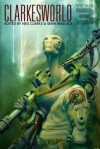

I don't really know what to say about this book, literature-wise. What I know is that it touched me. I left a comment over halfway through, about crying to the beat of the lifting bits, and negative spaces, and I don't know if I'm capable of doing it more justice.
There was a lot that kept crashing over and over, in the echoes of lines and themes through the ages, and stays with me: Freedom as owning yourself. Freedom being necessary to be able to love. What can't be borne, what breaks you, the sequels, the need sometimes to leave the past buried. This idea:
“You your best thing, Sethe. You are.”
And this idea:
For years Paul D believed schoolteacher broke into children what Garner had raised into men. And it was that that made them run off. Now, plagued by the contents of his tobacco tin, he wondered how much difference there really was between before schoolteacher and after. Garner called and announced them men—but only on Sweet Home, and by his leave. Was he naming what he saw or creating what he did not? That was the wonder of Sixo, and even Halle; it was always clear to Paul D that those two were men whether Garner said so or not.
But over all, this:
“Here,” she said, “in this here place, we flesh; flesh that weeps, laughs; flesh that dances on bare feet in grass. Love it. Love it hard. Yonder they do not love your flesh. They despise it. They don’t love your eyes; they’d just as soon pick em out. No more do they love the skin on your back. Yonder they flay it. And O my people they do not love your hands. Those they only use, tie, bind, chop off and leave empty. Love your hands! Love them. Raise them up and kiss them. Touch others with them, pat them together, stroke them on your face ’cause they don’t love that either. You got to love it, you! And no, they ain’t in love with your mouth. Yonder, out there, they will see it broken and break it again. What you say out of it they will not heed. What you scream from it they do not hear. What you put into it to nourish your body they will snatch away and give you leavins instead. No, they don’t love your mouth. You got to love it. This is flesh I’m talking about here. Flesh that needs to be loved. Feet that need to rest and to dance; backs that need support; shoulders that need arms, strong arms I’m telling you. And O my people, out yonder, hear me, they do not love your neck unnoosed and straight. So love your neck; put a hand on it, grace it, stroke it and hold it up. And all your inside parts that they’d just as soon slop for hogs, you got to love them. The dark, dark liver—love it, love it, and the beat and beating heart, love that too. More than eyes or feet. More than lungs that have yet to draw free air. More than your life-holding womb and your life-giving private parts, hear me now, love your heart. For this is the prize.”

 1
1

















